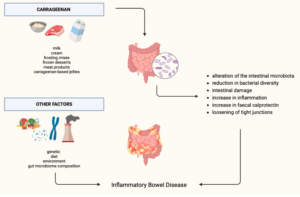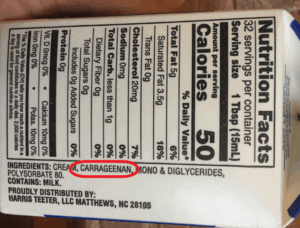 The gut is more than just a digestive organ – it’s a command center for immunity, inflammation, and overall health. So when a silent additive like carrageenan starts making waves in the world of inflammatory bowel diseases (IBD), it’s worth a closer look.
The gut is more than just a digestive organ – it’s a command center for immunity, inflammation, and overall health. So when a silent additive like carrageenan starts making waves in the world of inflammatory bowel diseases (IBD), it’s worth a closer look.
Over the past few decades, rates of IBD – specifically Crohn’s disease and ulcerative colitis – have surged, particularly in developed countries. While genetics play a role, environmental and dietary factors are increasingly implicated. Among the most recently scrutinized of these is carrageenan, a common food additive that many people are unknowingly consuming every day.
What Is Carrageenan, and Why Is It Everywhere?
Carrageenan is derived from red seaweed, particularly from species like Chondrus crispus, commonly known as Irish moss. For centuries, seaweed has been a traditional food thickener, but modern food science has refined and industrialized it into carrageenan, an emulsifier and stabilizer used to improve texture and shelf life in processed foods.
You’ll find it in:
- Milk products, especially non-dairy milks (almond, oat, soy)

- Ice cream and puddings
- Deli meats
- Infant formulas
- Plant-based yogurts
- Toothpaste
It sounds natural – and technically, it is – but “natural” doesn’t always mean harmless.
The Carrageenan Controversy: Safe or Subtle Saboteur?
Carrageenan exists in two forms:
- Undegraded carrageenan, used in food
- Degraded carrageenan, also known as poligeenan, is used in industrial and medical studies (and not approved for food)
The food industry often argues that concerns stem from confusion between these two. But here’s the catch: even undegraded carrageenan can break down into its degraded counterpart during digestion, or when exposed to acid and heat.
Numerous animal and in vitro studies suggest that carrageenan can trigger inflammation, disrupt the gut lining, and activate immune responses even at small doses. Despite this, regulators like the FDA and EFSA continue to allow its use, citing insufficient evidence from human trials.
How Carrageenan Affects the Gut
Carrageenan’s effects on gut health go beyond vague concerns – it appears to engage several biological mechanisms relevant to IBD:
Immune Activation
Carrageenan has been shown to activate immune receptors like Toll-like receptor 4 (TLR4) and induce the NF-kB pathway, which promotes the release of inflammatory cytokines like IL-8. This is a red flag for those with IBD, where immune dysregulation is already rampant.
Barrier Disruption
The gut lining – your body’s inner firewall – is critical in keeping pathogens out and nutrients in. Carrageenan has been observed to damage epithelial cells and compromise tight junctions between them. The result? Increased intestinal permeability, or “leaky gut,” which is a hallmark feature of IBD pathology.
Microbiome Disturbance
Emerging studies suggest carrageenan may also disturb gut microbiota balance, reducing beneficial species and potentially fostering dysbiosis – a microbial imbalance linked to many chronic conditions, including IBD.
Synergistic Risks
Carrageenan rarely operates in isolation. It coexists with other dietary stressors – seed oils, emulsifiers, preservatives, and synthetic sweeteners – all of which may collectively fuel inflammation. Think of it not as a lone offender, but as part of a chemical cocktail our modern gut has to deal with daily.

A Regulatory Blind Spot?
Although carrageenan has been banned from infant formulas in the European Union, it’s still allowed in organic formulas in the U.S. – a fact that has, understandably, stirred a lot of public concern. Critics argue that regulatory bodies have been too slow to respond to mounting evidence and too reliant on outdated safety studies, many of which are industry-funded.
Moreover, carrageenan’s “GRAS” status (Generally Recognized As Safe) in the U.S. allows it to bypass rigorous safety testing required for new food additives. In a landscape where chronic diseases like IBD are on the rise, this laissez-faire attitude toward food chemicals feels increasingly outdated.
Real People, Real Reactions
Beyond the lab, countless individuals with gut issues report improvement after cutting carrageenan from their diets. While anecdotal, these reports echo a familiar story: official science hasn’t caught up with the lived experience of many people.
cutting carrageenan from their diets. While anecdotal, these reports echo a familiar story: official science hasn’t caught up with the lived experience of many people.
IBD support forums, Reddit threads, and functional medicine blogs are filled with testimonies from people who’ve experienced less bloating, reduced flare-ups, and better digestion after eliminating carrageenan-laden foods. Though not conclusive, these stories provide a grassroots signal that deserves more rigorous scientific follow-up.
How to Spot and Avoid Carrageenan
Carrageenan is a master of disguise. It’s not always obvious on labels, especially in “natural” or “organic” products where consumers least expect it. Here are tips to avoid it:
- Read ingredient lists closely – even organic foods can contain carrageenan.
- Watch out for non-dairy products like almond and soy milks. Many contain it for texture.
- Check health foods and supplements – especially protein powders and nutrition bars.
- Make your own versions: Homemade nut milk or coconut yogurt is surprisingly easy and carrageenan-free.
Better (Though Not Perfect) Alternatives
- Guar gum and xanthan gum are often used in place of carrageenan, but they come with their own tolerability issues for sensitive individuals.
- Gellan gum, pectin, and arrowroot powder are other stabilizers that may offer safer functionality with fewer side effects.
Conclusion: Proceed With Caution
Carrageenan may not be the sole cause of IBD, but it’s a potential trigger that should not be ignored, especially for the increasing number of people already dealing with gut issues. When we consider how often this additive appears in foods marketed as “healthy,” the disconnect becomes even more glaring.
not be ignored, especially for the increasing number of people already dealing with gut issues. When we consider how often this additive appears in foods marketed as “healthy,” the disconnect becomes even more glaring.
The science isn’t settled, but the precautionary principle says this: If there’s reasonable doubt about an additive’s safety, and viable alternatives exist, why not err on the side of your gut?
Reducing exposure to carrageenan may not cure IBD, but it might lessen the inflammatory load your digestive system has to bear. In a world flooded with processed foods and artificial ingredients, small dietary changes can add up to big improvements in health over time.
Got questions about other hidden additives or want help navigating gut-friendly eating? Drop them in the comments or reach out – we would love to hear your story.









